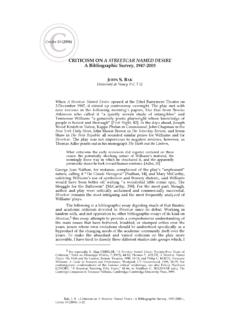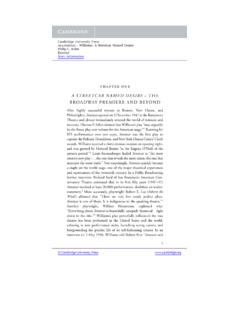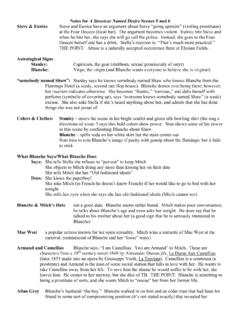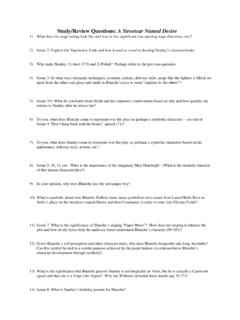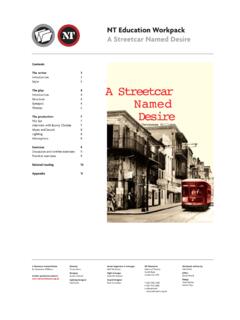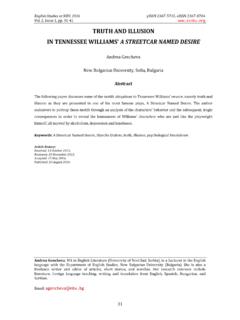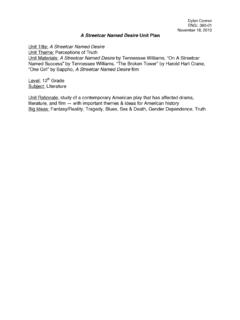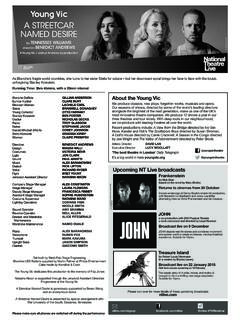Transcription of A Streetcar Named Desire responses - El Camino …
1 1A Streetcar Named DesireResponses to Preparing for the Film1. Upper-class females were expected to behave as "southern belles," gracious, respectable, and lady-like. Women were typically encouraged to show restraint even to the point of submissiveness and to avoid being assertive, dominant, or vulgar. Their sexual drives anddesires typically needed to be masked or denied, certainly in public and often to themselves. Women were expected to enhance the man's self-esteem and never overshadow it. Upper-class males were expected to be "gentlemen," to show courtesy andrespect to women, and to protect and provide for their wives and families.
2 2. Some of our students may have had personal experience with family members marrying between classes and will understand the pressure on someone from a lower economic class to "measure-up." Others will recognize how wealthy family members may look down on someone who is not in their social class. Such attitudes can cause a working-class husband to feel defensive, resentful, or rebellious and may even prompt the wife to be more critical of her spouse. 3. Many students may be aware of the rigorous Production Code that, by 1950, had been regulating the movie industry for twenty years. This Code was responsible for censorship of any content that could be seen as capable of corrupting American society: profanity, obscenity, nudity, depictions of murder and crime, explicit dancing, sexuality, homosexuality, ridicule of religion, and unpatriotic ideas.
3 Three controversial scenes from the play had to be adapted to satisfy censors--Blanche's interaction with the newspaper collector, Allan's homosexuality, and Stanley's rape of Blanche. In addition, the Catholic Legion of Decency also exerted a strong influence on the entertainment industry during this era, but in 1993, Warner Bros. reinstated three minutes of the excised If students have read Tennessee Williams' play, they will recognize certain challenges fora director adapting this play to a film production, particularly in 1951: where to find actors who can capture these powerful characters and their conflicts how to help viewers empathize, to some degree.
4 With both Blanche and Stanley how much to "expand" scenes beyond Stella and Stanley's apartment how to integrate the music--the "blue piano" and the polka tunes whether to add any flashbacks to dramatize Blanche's background how to handle the scene between Blanche and the newsboy without risking censorship how to hint at Allan's homosexuality without being censored how much to show of the rape how to capture Blanche's emotional instability whether to have Stella stay with Stanley at the end of the film25. Most students are familiar with discrimination against gay people, but they may need to be reminded of how most gay individuals felt isolated, ashamed, and often in denial of their sexual orientation.
5 Many men felt pressure to be "manly to avoid ridicule and rejection for seeming effeminate or a "sissy." The predominant view was that homosexuality was not natural and was even to Reflecting on the Film1. In the opening scene of the film, the camera records Blanche s arrival at the train station in New Orleans. She is a well-dressed woman in tailored suit with consciously selected accessories hat, jewelry, flowers bunched on her lapel. She would be admirable if it were not immediately apparent that she is intensely nervous and insecure. Even though she has exact directions to find her sister s home which Streetcar to take, the address of the apartment Blanche is more puzzled and distressed than she is a confident woman accustomed to traveling alone.
6 She is immediately helped by a sailor who perceives her concern. In her first conversation with her sister, she admits that she needs a drink, that she is on the verge of lunacy, and that her nerves are broken. Later, she admits that sheis shaken up, hot and tired. She lies to her sister when she claims that her broken nerves are why she has left the school term before the end of the semester. She seems frail, insecure, and physically incapable of dealing with the environment. 2. In this play, several of Tennessee Williams' names have symbolic significance. As Blanche mentions when she first sees her sister, "Stella for star!
7 " Indeed, Stella, pregnant and in love with Stanley, seems to be radiant throughout the film. Stella is able to shine on her own, after leaving her childhood estate, and her passion for Stanley burns intensely. It seems deliberate that the newspaper that Stella subscribes to is The Evening Star. Blanche tries to avoid the light and stay out of any lights that expose her aging. Blanche's name is French for "white," suggesting purity and innocence. Blanche seems tohave been innocent and even naive when she married Allan, not realizing he was gay, buther name is clearly ironic as, after Allan's death, she has numerous sexual encounters with "strangers"at a disreputable hotel and even seduces one of her students, which causes her to be fired.
8 Blanche's last name Dubois is French for woods so, as she tells Mitch, "the two together mean white woods. Like an orchard in spring! You can remember it by that" (59). The woods image may suggest wilderness and the wild or unknown realms, even the fertility or sexual abandon of springtime, so the combination of "white" and "woods" captures Blanche's conflicting nature, her double edge. "Elysian" means "happy" and "delightful" and "Elysian Fields" refers to the abodeof the blessed in Greek mythology. Therefore, Elysian Fields is the paradise or the happy land of the Greek poets. Blanche catches the irony that this is her sister's address since Stanley and Stella's claustrophobic apartment in a run-down area of New Orleans seems to Blanche to be far from paradise.
9 In fact it is where she is raped and sent away to an asylum. It seems fitting that Blanche arrives on a Streetcar Named Desire , desperate and searching for a home and sanctuary. When Stella explains her feelings for Stanley, Blanche charges, "What you are talking about is brutal Desire --just-- Desire !--the name of 3that rattle-trap street-car that bangs through the Quarter, up one old narrow street and down another" (81). When Stella asks Blanche, "Haven't you ever ridden on that street-car?" Blanche responds, "It brought me here, Where I'm not wanted and where I'm ashamed to be" (81). Streetcars are noisy and inexpensive public transportation that seemed antiquated even then.
10 Blanche and Stella grew up on a southern estate, Belle Reve, which means "beautiful dream," but the family encountered hard times because of the men's debaucheries and eventually lost the property and any wealth that they had. Losing this "beautiful dream" foreshadows Blanche's downfall in society as well as her personal and emotional decline. 3. Initially, the tensions between Stanley and Blanche might be attributed to their differences in background, that they come from different social classes. It is true that there are class differences: Blanche s family is old Southern gentility, and Stanley's family is working class.











